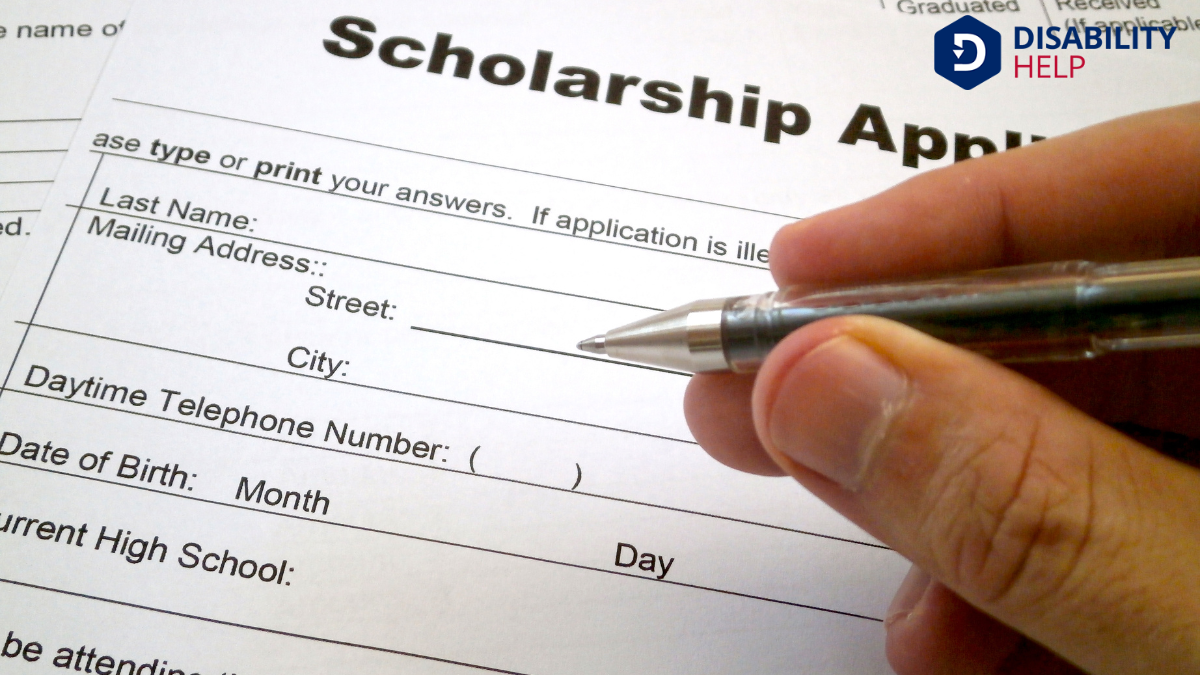If you’re traversing the world of disability-specific scholarships, it’s vital to understand who qualifies. Typically, these scholarships are for individuals with documented disabilities, such as mobility impairments, sensory disabilities, or intellectual challenges. Academic performance and financial need often play a role, too. But what exactly do you need to prove eligibility, and how can you find the right scholarships for your unique situation? Let's explore these essential details.
Key Takeaways
- Applicants must have a documented disability, verified by a healthcare provider, to qualify for disability-specific scholarships.
- Strong academic performance, often with a minimum GPA of 2.5, is typically required for eligibility.
- Financial need must be demonstrated, considering family income and disability-related expenses.
- Residency requirements may apply, limiting eligibility to students from specific regions or states.
- Personal essays are often required to articulate aspirations and educational goals.
Understanding Disability Categories
When delving into disability-specific scholarships, it’s important to understand the various disability categories.
These categories can range from physical disabilities, like mobility impairments, to sensory disabilities, such as hearing or vision loss.
You might also encounter intellectual and developmental disabilities, which include conditions like autism or Down syndromeA genetic disorder caused by an extra chromosome 21, leading to developmental and intellectual delay....
Each category has unique challenges and needs, so scholarships often tailor their criteria accordingly.
Academic Requirements for Eligibility

Recognizing the distinct categories of disabilities sets the stage for understanding the academic requirements tied to scholarships. Typically, they seek students who demonstrate strong academic performance despite challenges.
Confirm you meet the minimum GPA requirement, often around a 2.5 or higher. Some scholarships might prioritize specific fields of study, so check if your major aligns with their focus.
It's vital to provide transcripts and any additional documentation that highlights your academic journey. Consider including letters of recommendation from teachers or mentors who can vouch for your perseverance and dedication.
Occasionally, scholarship committees value personal essays that showcase your aspirations and educational goals. Stay informed about deadlines and confirm all required materials are submitted on time to maximize your chances.
Financial Need Considerations
Several scholarships for students with disabilities take financial need into account, offering critical support to those who face economic challenges.
When you're applying, it's vital to understand how financial need influences eligibility. Many scholarship committees require a demonstration of need to guarantee that funds reach the students who need them most. This means you might've to provide evidence of your financial situation, such as family income or expenses.
It's also important to note that financial need doesn't always mean having no resources. Scholarships often consider factors like medical expenses, adaptive equipmentDevices that assist individuals with disabilities in performing ADLs, such as grab bars or shower ch..., or other disability-related costs.
Required Documentation for Application
Understanding the role of financial need in your scholarship application is just one step in the process. Gathering the right documentation is essential for a successful application.
First, make sure you have proof of your disability. This could be a letter from your healthcare provider or relevant medical records.
Next, prepare personal identification documents like your ID or birth certificate. They verify your identity and residency status.
Also, you might need academic records or transcripts to demonstrate your educational background.
To keep things organized, consider creating a checklist:
- Proof of Disability: Medical records or a doctor's letter.
- Personal Identification: ID or birth certificate.
- Academic Records: Transcripts or report cards.
Scholarships for Specific Disabilities

When you're searching for scholarships tailored to specific disabilities, it's important to explore the diverse opportunities available. Scholarships exist for various disabilities, including visual impairments, hearing lossPartial or total inability to hear sounds in one or both ears., autism, and physical disabilities. These programs often aim to reduce financial barriers and support your educational journey.
Start by researching organizations dedicated to your specific disability, as they often offer scholarships. Look into national and local foundations, as well as educational institutions, which may provide tailored financial aid.
Some scholarships may require advocacyThe act of arguing in favor of, supporting, or defending the rights and interests of individuals or ... or community service, so consider those that align with your interests and strengths. Keep an eye on deadlines and specific criteria, such as proof of disability or academic performance.
Age and Enrollment Status Criteria
While diving into scholarships, you'll find that age and enrollment status often play a crucial role in eligibility criteria. Some scholarships are designed for high school seniors moving to college, while others cater to those already enrolled in undergraduate or graduate programs. Understanding these criteria helps tailor your search and improves your chances of securing funding.
You must pay attention to specific requirements, as they can vary widely.
Here are some key points to reflect on:
- Age Restrictions: Some scholarships specify a minimum or maximum age, so check if you qualify.
- Enrollment Status: Verify if the scholarship requires full-time or part-time enrollment.
- Academic Level: Scholarships may target specific academic stages, such as incoming freshmen or current graduate students.
Geographic and Residency Limitations
Geographic and residency limitations can greatly influence your eligibility for disability-specific scholarships. Scholarships often target students from specific regions, states, or even towns. If you live in a certain area, you might qualify for scholarships designated for residents of that location.
These parameters guarantee that funds support local communities and address specific regional needs.
Residency status also plays a significant role. Some scholarships require you to be a resident for a certain period, while others might be open to non-residents or international students.
Always check each scholarship's guidelines to understand if your current location or residency status aligns with their requirements. By knowing these limitations, you can focus on opportunities that suit your situation and enhance your chances of securing financial aid.
How to Find and Apply for Scholarships

Wondering how to locate and apply for disability-specific scholarships? Start by exploring online scholarship databases like Fastweb or Scholarship.com.
These platforms let you filter results based on your disability, making it easier to find relevant options. Also, check with local disability organizations or your school’s financial aid office—they often have lists of scholarships you mightn't find online.
When applying, pay close attention to requirements and deadlines. Tailor your applications to highlight your unique experiences and strengths.
Here are three steps to help streamline your search and application process:
- Research thoroughly: Look for scholarships that align with your specific disability and educational goals.
- Stay organized: Keep track of deadlines and required documents.
- Seek guidance: Don’t hesitate to ask mentors or advisors for application advice.
Conclusion
To qualify for disability-specific scholarships, you must understand the disability categories and meet the academic requirements, often with a minimum GPA of 2.5. Consider your financial need and gather all necessary documents, including proof of disability and academic records. Check if there are scholarships tailored to your specific disability, and be aware of any age, enrollment, or geographic criteria. Finally, actively search and apply for scholarships to maximize your opportunities for financial support in education.






